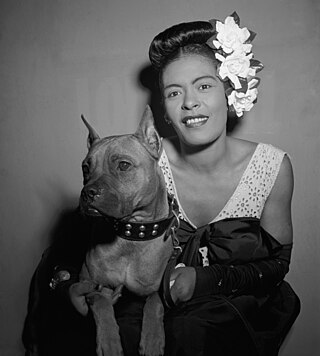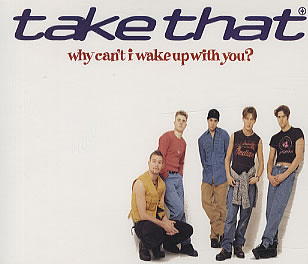Related Research Articles

Billie Holiday was an American jazz and swing music singer. Nicknamed "Lady Day" by her friend and music partner, Lester Young, Holiday made a significant contribution to jazz music and pop singing. Her vocal style, strongly influenced by jazz instrumentalists, inspired a new way of manipulating phrasing and tempo. She was known for her vocal delivery and improvisational skills.

"Gentle on My Mind" is a song that was written and originally recorded by John Hartford, and released on his second studio album, Earthwords & Music (1967). Hartford composed the song after watching Doctor Zhivago in 1966, as he was inspired by the film and his own personal experiences. The lyrics describe the reminiscences of lost love of a man as he travels through the country. An obituary for Hartford provided more specifics, indicating that the lyrics are "about a hobo reminiscing about a lost love". The following year, Hartford released the song as a single on RCA Records.
"Wheel of Fortune" is a popular song written by Bennie Benjamin and George David Weiss and published in 1951. It is best remembered in the 1952 hit version by Kay Starr.
Cecil Mack was an American composer, lyricist and music publisher.

"Swear It Again" is a song by Irish boy band Westlife. The ballad was released on 19 April 1999 in the United Kingdom as the first single from their debut album, Westlife (1999). The song peaked at number one on the UK Singles Chart for two weeks, giving Westlife their first of 14 UK number-one singles. "Swear It Again" is Westlife's only single to have charted in the US, peaking at number 20 on the Billboard Hot 100 and ranking number 75 on the Billboard Hot 100 year-end chart in 2000.

At the 1952 Summer Olympics in Helsinki, four diving events were contested.

"Why Can't I Wake Up with You" is a song by English boy band Take That. Written by bandmember Gary Barlow, the song was released on 8 February 1993 by RCA and BMG as the lead single from their second album, Everything Changes (1993). The song reached number two on the UK Singles Chart and number seven in Ireland

"Love Ain't Here Anymore" is a song by English boy band Take That. Released on 27 June 1994 by RCA and BMG, it was the sixth and final single taken from the band's second studio album, Everything Changes (1993). The song peaked at number three in the UK Singles Chart, ending their string of consecutive number-one singles. It failed to overtake Wet Wet Wet's cover of "Love Is All Around" at number one, and American R&B group, All-4-One, who reached number two with "I Swear". "Love Ain't Here Anymore" was re-recorded for release in the United States and included on their first Greatest Hits compilation in 1996.
"I've Got My Love to Keep Me Warm" is a popular song copyrighted in 1937 by its composer, Irving Berlin, and first recorded by (i) Ray Noble, Howard Barrie, vocalist; (ii) Red Norvo, Mildred Bailey, vocalist; (iii) and Billie Holiday with her orchestra. The song – sung by Dick Powell and Alice Faye – debuted on film February 12, 1937, in the musical, On the Avenue.
Malcolm Stuart Boylan was an American screenwriter, writer, and founder of the U.S. Coast Guard Auxiliary.
Strother may refer to:

"I Love You" is a song written by Keith Follesé, Adrienne Follesé and Tammy Hyler, and recorded by American country music singer Martina McBride. It was released in July 1999 as the first single from her album Emotion. McBride originally recorded "I Love You" for the 1999 film's soundtrack, Runaway Bride, starring Julia Roberts and Richard Gere. The single was also included on McBride's then-upcoming album Emotion and later appeared on her Greatest Hits compilation album.

USS Okaloosa (APA-219) was a Haskell-class attack transport in service with the United States Navy from 1944 to 1949. She was scrapped in 1972.

Alexander Miles was an African American inventor and businessman, known for being awarded a patent for automatically opening and closing elevator doors. He was awarded U.S. patent 371,207 on October 11, 1887.
The Moonmaids were an American female jazz and popular vocal quartet that started out as college student entertainers under the name "North Texas Swingtet." As the Swingtet, they launched and performed with the Aces of Collegeland at the University of North Texas in 1943 and grew in popularity throughout the region. Vaughn Monroe hired the group, renamed it "The Moonmaids," and debuted them with his orchestra on April 11, 1946, at Loews Theater in Washington, D.C. The Moonmaids rapidly rose to national acclaim performing and recording with the Vaughn Monroe Orchestra for RCA Victor. Within four months of joining Monroe, the Moonmaids were on the cover of Down Beat and featured in Radio Mirror With personnel changes now and then, the Moonmaids performed with Vaughn Monroe from 1946 to 1952.

Wayne Rhoden is a music producer, singer, songwriter, sound engineer and video editor/director who is professionally known as the artist Father Goose Music, is the winner of the 18th Annual Independent Music Awards and the Grammy Awards with the group “Dan Zanes and Friends” also Nominated for the 64th Grammy Awards for Best Children's Album with the group 1 Tribe Collective and he is also known as Rankin Don and Don Chibaka. Seen on the Disney Channel, he also peaked at # 7 on the Billboard Reggae Chart.
"Bermuda" is a song written by Cynthia Strother and her father Eugene Rex Strother, which was initially performed and released in 1951 by 16-year-old Cynthia and her younger 11-year-old sister, Kay Strother, who performed together under The Bell Sisters moniker for RCA Records. Their recording of the song featured Henri René and His Orchestra.
St. Luke's Church, Kensington, was an Episcopal congregation in Kensington neighborhood of Philadelphia, Pennsylvania. The parish was founded in 1904 as an outgrowth of the Episcopal Hospital Mission. The church – located at the northwest corner of East Huntingdon and B Streets at Kensington Avenue – was designed by Allen Evans of Furness & Evans, and completed in 1904. Its parish house, just north of the church, was designed by Furness & Evans, and completed in 1905. Description: "The new [parish house] building will cost $35,000, and is to be a two-story building constructed of Holmesburg granite. The first floor will be used for classes—the Sunday School numbers 1,500,—the second floor for the chapel and library, and a gymnasium will be located in the basement."

AKB48 Team SH is a Chinese idol group based in Shanghai, China and an official sister group of the Japanese idol girl group AKB48. It was established in 2018 after the dissolution of AKB48's relationship with the girl group SNH48 back in 2016.

The Singing Brakeman is a 1929 short film, starring Jimmie Rodgers, and released by Columbia-Victor Gems. Rodgers sings three of his songs: "Waiting for a Train", "Daddy and Home" and "Blue Yodel".
References
- ↑ Strawther, Larry Wayne (born 1952) (2014). Seal Beach: A Brief History (limited preview). Charleston, South Carolina: The History House. Retrieved May 27, 2022– via Google Books.
{{cite book}}: CS1 maint: numeric names: authors list (link) LCCN 2014-10143; ISBN 978-1-6261-9489-2 (paperback); OCLC 881591697(all editions). - ↑ Barnes, Mike (February 20, 2024). "Cynthia Strother, One-Half of the Singing Bell Sisters, Dies at 88". The Hollywood Reporter. Retrieved February 21, 2024.
- ↑ "Bell Sisters (RCA) (1951-1959) - Home". Bellsisters.com (website maintained by Rex Strother of Salt Lake City. He is a nephew of Cynthia and Kay).
{{cite web}}: CS1 maint: postscript (link) - ↑ Press-Telegram Southland Magazine; Zinser, Ben (né Arthur Benjamin Zinser; born 1921) (March 23, 1952). "How Those Bells do Sing!". Independent (Sunday magazine of the Long Beach Press-Telegram . Vol. 65, no. 53).
 . Vol. 5, no. 9. Long Beach, California. pp. 2, 5. Retrieved April 21, 2017– via Newspapers.com.
. Vol. 5, no. 9. Long Beach, California. pp. 2, 5. Retrieved April 21, 2017– via Newspapers.com.{{cite news}}: CS1 maint: multiple names: authors list (link) CS1 maint: numeric names: authors list (link); OCLC 848179387(all editions). - ↑ Chillicothe Constitution-Tribune (The); Handsaker, Gene (né Eugene Stirling Handsaker; 1910–1985) (April 22, 1952). "Singing Bell Sisters, 16 and 12, Find Fame Has Drawbacks". The Chillicothe Constitution-Tribune.
 . Vol. 59, no. 93 (Daily ed.). Chillicothe, Missouri. Associated Press. p. 1 (section 3). Retrieved April 21, 2017– via Newspapers.com.
. Vol. 59, no. 93 (Daily ed.). Chillicothe, Missouri. Associated Press. p. 1 (section 3). Retrieved April 21, 2017– via Newspapers.com.{{cite news}}: CS1 maint: multiple names: authors list (link) CS1 maint: numeric names: authors list (link)
- 1 2 "The Bell Sisters". Home.earthlink.net.
- ↑ "Phil Harris And The Bell Sisters – Piece A-Puddin' / Hi-Diddle-Diddle". Discogs.com. October 1952. Retrieved April 28, 2017.
- ↑ Southland (December 5, 1954). "The Bell Sisters Are Growing Up". Independent (Sunday magazine of the Independent-Press-Telegram . Vol. 3, no. 16).
 . Long Beach, California. p. 3. Retrieved April 21, 2017– via Newspapers.com.; OCLC 848179387(all editions).
. Long Beach, California. p. 3. Retrieved April 21, 2017– via Newspapers.com.; OCLC 848179387(all editions).